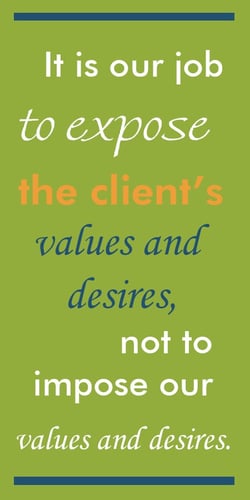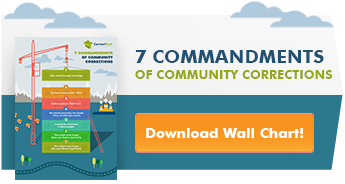 After cutting through the fog of small talk and vague concerns with the Kickstart Question and a series of And What Else? questions, you have narrowed the focus. Perfect. Time to fix it, right? Wrong. It is time to slow down your urge to believe your brain that you know the problem and have the solution. Narrowing the focus is different than specifically defining the problem. You are getting closer but aren’t there yet.
After cutting through the fog of small talk and vague concerns with the Kickstart Question and a series of And What Else? questions, you have narrowed the focus. Perfect. Time to fix it, right? Wrong. It is time to slow down your urge to believe your brain that you know the problem and have the solution. Narrowing the focus is different than specifically defining the problem. You are getting closer but aren’t there yet.
The third question in Michael Bungay Stanier’s The Coaching Habit: Say Less, Ask More and Change the Way You Lead Forever is the Focus Question. “What’s the real challenge here for you?” We’ve addressed the danger of the Advice Monster in a previous blog and it is most likely to attempt to take over the discussion here. Your frontal lobe is now convinced it fully understands the issue and the advice monster is eager to do its bidding. The Advice Monster impulsively disagrees with a basic tenet of therapeutic intervention; It is our job to expose the client’s values and desires, not to impose our values and desires. Unsolicited advice is an attempt to impose our values on a client. You are in good company. We all have that urge. Instead, let’s find out what the real challenge is for them at this moment.
Consider the following conversation between a client, Betsy, her therapist and the therapist’s advice monster. (Yes, the advice monster is always part of the conversation. Notice that the advice monster responds to every comment from the client AND every comment from the therapist.)
Betsy: Well…my husband drank a whole bottle of scotch last night
Advice Monster: Let’s tell her how to avoid being codependent and how to set limits with an alcoholic.
Therapist: OK…
Advice Monster: “OK?” “OK?” Are we going to help this woman or not. Let’s explain the dynamics of alcoholism in a relationship!
Betsy: I couldn’t believe it. The whole bottle.
Therapist: Tell me more. (The therapist needs more information because there has been no discussion of a problem, only a set of facts…no idea what the problem is.)
Advice Monster: We have all the info we need. I bet she grew up with an alcoholic father.
Betsy: (tearfully) I don’t know what I’m going to do.
Advice Monster: You don’t need to do anything. I will do it for you.
Therapist: What’s the real challenge here for you?
Advice Monster: I thought you were trained to listen. Aren’t you listening? Her husband drank an entire bottle of scotch last night.
Betsy: I was planning on an intimate evening together but then he fell asleep. Scotch always does that to him. We’ve both been so busy that we haven’t really connected in months. Last night was a lost opportunity and I’m disappointed.
Advice Monster: Oh. Well…I didn’t see that coming.
Therapist: So you’re disappointed that you couldn’t really connect with him?
Betsy: Yes. We are so busy. I wonder if we will ever find time to connect again.
 See how quickly the advice monster jumps to conclusions about the real problem? Surprised that the drinking was not part of the primary concern for Betsy in this moment? It is surprising how often you’ll be surprised if you slow down, ask good questions, and really listen.
See how quickly the advice monster jumps to conclusions about the real problem? Surprised that the drinking was not part of the primary concern for Betsy in this moment? It is surprising how often you’ll be surprised if you slow down, ask good questions, and really listen.
Let’s look at the various elements of the Focus Question.
“What is the real challenge…?” Without a context this question is vague and open to interpretation. The Kickstart Question and the AWE Questions have created some of the context, but without more context, an answer to this vague question is not likely to create greater focus, which is the goal. In summary, What are the facts?
“What is the real challenge here…?” Adding “here” makes it clear that we are discussing the here and now that we just identified, not what might have led to the problem years ago…not how your family role as a child plays into the current dynamics. In other words, we’ve identified what concerns you but not exactly why it’s a problem. In summary, why do those facts create a problem?
“What is the real challenge here for you?” Adding “for you” makes all of the difference. It implies (rightfully) that we are discussing the problem with the client. Without the “for you”, the answer is often about how someone else in their life needs to do something different. Since others can’t read our mind and, even when they do know the issue, don’t see things the way you do, the discussion needs to center on the client…the YOU! In summary, why do those facts create a problem for the client’s “you?”
The Focus Question is doing the following:
- Identifying the problem…don’t forget to ask the AWE question several times.
- Emphasizing that we are talking about the here and now…why is this bothering you now?
- Clarifying that we are focused only on the client…we can’t change someone else’s behavior.
Again, the Advice Monster will be eager here. Stop and think about something for a minute. By giving unsolicited advice, you are disclosing that you do not believe your client is capable of identifying a solution on their own. I know you don’t actually intend for that to be the message, but it is. Also, they are not going to take your advice unless they have ask for it. So, allowing the Advice Monster to break through, you have insulted your clients’ problem-solving abilities and created resistance. Read that sentence again. By providing unsolicited advice, you just made everyone’s life more difficult.
If you are like me, there are times that you assess your value as a coach/case manager/therapist based on the insightful things you said in a session. It feels good to feel wise. For those of you who look forward to getting to the real issue so that you can really help the person fix the issue, you are not going to like the next Coaching Habit question, The Lazy Question. Stay tuned for valuable information on how to be lazy.



